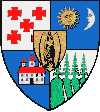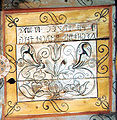
Hungarians in Romania
The Hungarian minority of Romania (Hungarian: romániai magyarok; Romanian: maghiarii din România) is the largest ethnic minority in Romania. As per the 2021 Romanian census, 1,002,151 people (6% of respondents) declared themselves Hungarian, while 1,038,806 people (6.3% of respondents) stated that Hungarian was their mother tongue.[1]
Romániai magyarok
232,157 (79.51%)
133,444 (66.71%)
165,014 (31.84%)
93,491 (28.27%)
112,387 (20.39%)
78,455 (11.55%)
Most ethnic Hungarians of Romania live in areas that were, before the 1920 Treaty of Trianon, parts of Hungary. Encompassed in a region known as Transylvania, the most prominent of these areas is known generally as Székely Land (Romanian: Ținutul Secuiesc; Hungarian: Székelyföld), where Hungarians comprise the majority of the population.[2] Transylvania, in the larger sense, also includes the historic regions of Banat, Crișana and Maramureș. There are forty-one counties of Romania; Hungarians form a large majority of the population in the counties of Harghita (85.21%) and Covasna (73.74%), and a large percentage in Mureș (38.09%), Satu Mare (34.65%), Bihor (25.27%), Sălaj (23.35%), and Cluj (15.93%) counties.
There also is a community of Hungarians living mostly in Moldavia, known as the Csángós. These live in the so-called region of Csángó Land in Moldavia but also in parts of Transylvania and in a village of Northern Dobruja known as Oituz. In addition, sparse populations of Székelys are to be found across southern Bukovina, inhabiting several villages and communes in Suceava County. Aside from the aforementioned historical regions of Romania, Bucharest was also home in the past and still is to a sizable Hungarian-Romanian community.
Politics[edit]
The Democratic Alliance of Hungarians in Romania (UDMR/RMDSZ) is the major representative of Hungarians in Romania, and is a member of the Unrepresented Nations and Peoples Organization. The aim of the UDMR is to achieve local government, cultural and territorial autonomy and the right to self-determination for Hungarians. UDMR is a member of the European Democrat Union (EDU) and the European People's Party (EPP). Since 1996, the UDMR has been a member or supporter of every governmental coalition.
Political agreements have brought the gradual implementation of Hungarian in everyday life: Public administration Law 215/2002 stipulates "the use of national minority languages in public administration in settlements where minorities exceed 20% of the population"; minority ethnics will receive a copy of the documents in Romanian and a translation in their language; however, official documents are preserved by the local administration in Romanian only; local administration will provide inscriptions for the names of localities and public institutions under their authority, and display public interest announcements in the native language of the citizens of the respective ethnic minority under the same 20% rule.
Even though Romania co-signed the European laws for protecting minorities' rights, the implementation has not proved satisfactory to all members of Hungarian community. There is a movement by Hungarians both for an increase in autonomy and distinct cultural development. Initiatives proposed by various Hungarian political organizations include the creation of an "autonomous region" in the counties that form the Szekler region (Székelyföld), roughly corresponding to the territory of the former Hungarian Autonomous Province as well as the historical Szekler land that had been abolished by the Hungarian government in the second half of the 19th century, and the re-establishment of an independent state-funded Hungarian-language university.
However, the situation of the Hungarian minority in Romania has been seen by some as a model of cultural and ethnic diversity in the Balkan area:[11] In an address to the American people, President Clinton asked in the midst of the air war in Kosovo: Who is going to define the future of this part the world... Slobodan Milošević, with his propaganda machine and paramilitary forces which compel people to give up their country, identity, and property, or a state like Romania which has built a democracy respecting the rights of ethnic minorities?[12]
Notable Hungarians of Romania[edit]
Sports[edit]
Several ethnic Hungarians[13] have won Olympic medals for Romania.
Identity and citizenship[edit]
Many Hungarians living in Transylvania were disconcerted when the referendum held in Hungary in 2004 on the issue of giving dual-citizenship to ethnic Hungarians living abroad failed to receive enough electoral attendance and the vote was uncertain. Some of them complain that when they are in Hungary, they are perceived as half-Romanians, and are considered as having differences in language and behaviour. However, a large proportion of Transylvanian Hungarians currently work or study in Hungary, usually on a temporary basis. After 1996, Hungarian-Romanian economic relations boomed, and Hungary is an important investor in Transylvania, with many cross-border firms employing both Romanians and Hungarians.
A proposal supported by the RMDSZ to grant Hungarian citizenship to Hungarians living in Romania but without meeting Hungarian-law residency requirements was narrowly defeated at a 2004 referendum in Hungary (the referendum failed only because there were not enough votes to make it valid).[37] After the failed vote, the leaders of the Hungarian ethnic parties in the neighboring countries formed the HTMSZF organization in January 2005, as an instrument lobbying for preferential treatment in the granting of Hungarian citizenship.[38]
In 2010 some amendments were passed in Hungarian law facilitating an accelerated naturalization process for ethnic Hungarians living abroad; among other changes, the residency-in-Hungary requirement was waived.[39] According to a RMDSZ poll conducted that year, over 85 percent of Romania's ethnic Hungarians were eager to apply for Hungarian citizenship.[40] Romania's President Traian Băsescu declared in October 2010 that "We have no objections to the adoption by the Hungarian government and parliament of a law making it easier to grant Hungarian citizenship to ethnic Hungarians living abroad."[41]
Between 2011 and 2012, 200,000 applicants took advantage of the new, accelerated naturalization process;[42] there were another 100,000 applications pending in the summer of 2012.[43] As of February 2013, the Hungarian government has granted citizenship to almost 400,000 Hungarians 'beyond the borders'.[44] In April 2013, the Hungarian government announced that 280,000 of these were Romanian citizens.[45]











